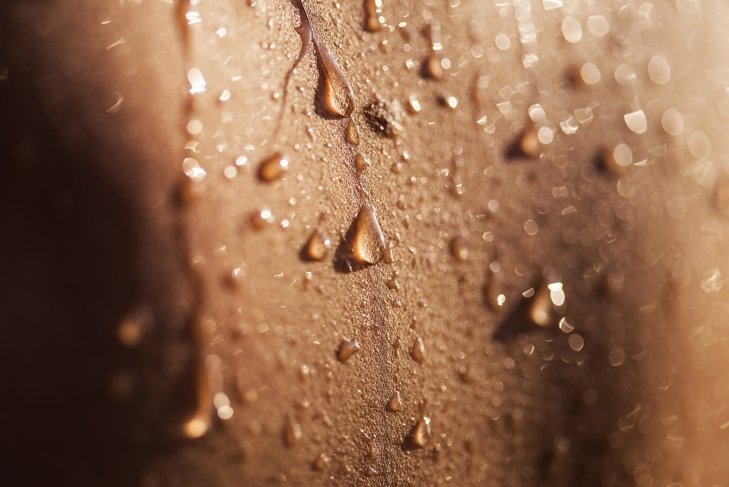
What does water have to do with skin? A ton, as it turns out!
Our skin is awash in water—30 percent water, in fact—and keeping it there can help make our complexions healthy and happy.
Water and our skin
Its water content is hugely responsible for our skin’s plumpness, elasticity, and resilience to the elements. Studies have found that decreased skin hydration is linked to greater depth and quantity of wrinkles. Yikes!
The good news is that by learning how to boost our skin hydration levels, we can improve the look and feel of our skin, and we may even be able to decrease signs of aging, including wrinkles. Do you know how to lock moisture into your skin? You may be surprised.
Guzzling water for your skin? There’s no need
Hydration is essential, no doubt. We certainly need to drink enough water; however, drinking the fabled eight glasses a day doesn’t automatically make our skin better. While the myth continues to persist in popular culture, it has no scientific basis.
Research shows that if we are chronically dehydrated, drinking sufficient water can boost skin thickness and density, but overhydrating is neither necessary nor beneficial. Plus, adequate hydration isn’t enough to help prevent signs of skin aging, such as wrinkles.
How do we know if we’re drinking enough water? An easy way to tell is to ensure our urine is pale yellow or colourless. Sometimes, we may be consuming more water than we realize: many foods—fruits and veggies, in particular—contain plenty of water.
We can help preserve moisture in our skin through other means
What does help preserve water in our skin, then? It all starts with the first step of our skin care routine: cleansing. It may sound strange, but our natural oil (sebum) helps keep our skin moisturized.
That’s why overscrubbing our skin or using harsh cleansers dries us out—by destroying our skin’s natural “waterproofing” oil layer, much-needed moisture escapes. The solution? Use a gentle facial cleanser without alcohol, sulphates, or artificial fragrances.
Moisturizing properly is equally important. Here are some ingredients that can help trap moisture in the skin.
Occlusives
Also known as “barriers” that work to waterproof the skin, occlusives include a number of different waxes, such as beeswax, candelilla wax, and carnauba wax.
Humectants
Ingredients that attract water to the skin, humectants include glycerin or hyaluronic acid (which has been shown to increase skin hydration and decrease the depth of wrinkles).
Emollients
A third type of moisturizing ingredient, emollients, doesn’t technically help hold water in the skin, but it does help smooth skin and can be very valuable in a moisturizer. Examples include many natural plant oils and butters, such as shea and cocoa butter.
Using a humectant without an occlusive can sometimes lead to water loss in the skin, so make sure your moisturizer of choice contains both types of ingredients. Thankfully, many excellent moisturizers that contain all three ingredient types are found at natural health retailers.
Water isn’t always the best skin care product ingredient
Although it seems counterintuitive, water itself doesn’t always make the best skin care ingredient. In moisturizers, it means the need for preservatives (natural or synthetic) and limits room for active ingredients, such as those described above.
On its own, water applied topically can even be drying, pulling moisture from the skin as it evaporates. That’s why it’s so important to apply moisturizer after showering or bathing.
Facial water mists can be skin care routine superstars
On the other hand, facial water mists can be moisturizing, provided they have the right ingredients and are used correctly. Beauty experts and bloggers alike attest to their numerous functions, such as setting makeup, helping to tone skin, refreshing and cooling skin through the day, and priming skin for makeup application.
Mists that contain ingredients such as natural plant extracts, vitamins, emollients, and humectants are formulated to be used without blotting, while pure thermal or mineral waters are meant to be patted off after a few minutes. Whichever you choose, make sure that it’s free from artificial fragrance, alcohol, and parabens, and select one formulated for your skin type.
The type of water we use on our skin matters
Not all water is created equal when it comes to skin care. Most importantly, make sure it’s not too hot. Water that’s too hot disrupts our lovely natural oil layer, letting precious water escape.
Hard water has also been linked to skin disorders such as dermatitis. Some individuals who live in locations with hard water and suffer from skin disorders choose to invest in a water softening system. Others swear by shower filters, saying that showering in filtered water helps their complexions.
A wintertime tip
It’s getting cooler outside! Unfortunately, dry, cold air can also dry out our skin. Try a humidifier in the winter months to help soothe dry and itchy skin.













